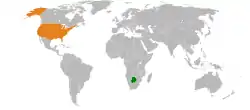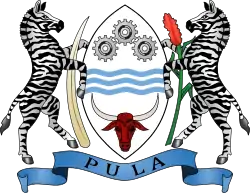Botswana–United States relations
Botswana–United States relations are the international relations between Botswana and the United States.
 | |
Botswana |
United States |
|---|---|
According to the 2012 U.S. Global Leadership Report, 79% of Botswana people approve of U.S. leadership, with 8% disapproving and 13% uncertain.[1]
United States aid to Botswana
The United States considers Botswana an advocate of and a model for stability in Africa and has been a major partner in Botswana's development since its independence. The U.S. Peace Corps returned to Botswana in August 2002 with a focus on HIV/AIDS-related programs after concluding 30 years of more broadly targeted assistance in 1997. Similarly, the USAID phased out a longstanding bilateral partnership with Botswana in 1996, after successful programs emphasizing education, training, entrepreneurship, environmental management, and reproductive health. Botswana, however, continues to benefit along with its neighbors in the region from USAID's Initiative for Southern Africa, now based in Pretoria, and USAID's Southern Africa Global Competitiveness Hub, headquartered in Gaborone. The United States International Board of Broadcasters (IBB) operates a major Voice of America (VOA) relay station in Botswana serving most of the African continent.
In 1995, the Centers for Disease Control (CDC) started the BOTUSA Project in collaboration with the Botswana Ministry of Health in order to generate information to improve tuberculosis control efforts in Botswana and elsewhere in the face of the TB and HIV/AIDS co-epidemics. Under the 1999 U.S. Government's Leadership and Investment in Fighting an Epidemic (LIFE) Initiative, CDC through the BOTUSA Project has undertaken projects and has assisted organizations in the struggle against the HIV/AIDS epidemic in Botswana. Botswana is one of the 15 focus countries for PEPFAR, the President's Emergency Plan for Aids Relief, and has received more than $556 million since the program began in January 2004 through September 2011. PEPFAR assistance to Botswana, which totaled $84.4 million in FY 2011, is contributing to HIV/AIDS prevention, treatment, and care interventions.
Agreements

The Governments of Botswana and the United States entered into an agreement in July 2000 to establish an International Law Enforcement Academy (ILEA) in Gaborone. The academy, jointly financed, managed and staffed by the two nations, provides training to police and government officials from across the Sub-Saharan region. The academy's permanent campus, in Otse outside of Gaborone, opened March 2003. Over 3,000 law enforcement professionals from Sub-Saharan Africa have received training from ILEA since it began offering classes in 2001.
Principal U.S. Officials
- Ambassador/ Charge D' Affairs—Craig Lewis Cloud
- Deputy Chief of Mission—Gregory Shaw
- Senior Defense Official / Defense Attache - LTC Joshua Reitz (Aug 2010)
- Office of Security Cooperation (previously Defense Cooperation)- LTC Joshua Reitz (Aug 2010)
- Centers for Disease Control—Dr. Margarett Davis
- International Board of Broadcasters— Charles Shepard
- International Law Enforcement Agency—Stan Moran
- Peace Corps—Peggy McClure
Diplomatic missions
The U.S. Embassy is in Gaborone. OSC (previously ODC) is located at the embassy. CDC is located on Ditlhakore Way in Gaborone. ILEA is located in Otse, about 30 minutes outside of Gaborone. The IBB station is located in Selebi-Phikwe, about 400 kilometers northeast of Gaborone.
References
- U.S. Global Leadership Project Report - 2012 Gallup
- "Antipode of Metsemotlhaba, Botswana - Geodatos". www.geodatos.net. Retrieved 2020-05-26.
![]() This article incorporates public domain material from the United States Department of State website https://2009-2017.state.gov/r/pa/ei/bgn/1830.htm#relations.
This article incorporates public domain material from the United States Department of State website https://2009-2017.state.gov/r/pa/ei/bgn/1830.htm#relations.
External links
![]() Media related to Relations of Botswana and the United States at Wikimedia Commons
Media related to Relations of Botswana and the United States at Wikimedia Commons
